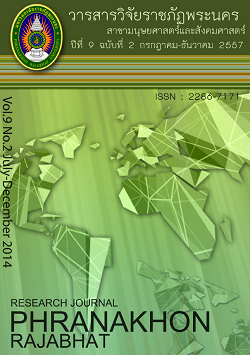ปัจจัยเชิงสาเหตุพหุระดับการให้อภัยของนักเรียนระดับประกาศนียบัตรวิชาชีพใน วิทยาลัยเทคนิค สังกัดสำนักงานคณะกรรมการการอาชีวศึกษา ภาคกลาง
Main Article Content
Abstract
ผลการวิจัยพบว่า (1) การพัฒนาแบบวัดการให้อภัยตามทฤษฎีของแมคคัลลัฟ และคณะในบริบทสังคมไทย พบว่า มีความแตกต่าง โดยโครงสร้างองค์ประกอบการให้อภัย ในบริบทสังคมไทย ประกอบด้วย 2 องค์ประกอบหลักคือ 1) องค์ประกอบการลดการแก้ แค้นและหลีกเลี่ยง ประกอบด้วยด้านย่อย 2 ด้านคือ ด้านการลดการแก้แค้น และด้านการ ลดการหลีกเลี่ยง ความเหินห่าง 2) องค์ประกอบการสร้างเสริมไมตรีจิต มิตรภาพ โดย มีข้อ คำถามรวมทั้งหมด 33 ข้อ ในการวิจัยเพื่อสร้างโมเดลปัจจัยเชิงสาเหตุพหุระดับการให้อภัย ใช้ด้านการลดการหลีกเลี่ยง ความเหินห่างและด้านการลดการแก้แค้น มีข้อคำถามจำนวน 21 ข้อ (2) ปัจจัยระดับนักเรียน ที่ส่งผลต่อการให้อภัยคือ บุคลิกภาพด้านความน่าชื่นชม ส่งผลทางตรงเชิงบวกการครุ่นคิด และการนับถือศาสนาส่งผลทางตรงเชิงลบ (3) ปัจจัยระดับ สาขาวิชา ที่ส่งผลต่อการให้อภัยคือ บรรยากาศการเรียนการสอนส่งผลทางตรงเชิงบวก
UNDER THE OFFICE OF VOCATIONAL EDUCATION COMMISSION IN CENTRAL REGION
The purposes of this research were develop the forgiveness scale for lower vocational certificate students according to McCullough et al in Thai social context and to develop the multilevel causal factors of forgiveness model of lower vocational certificate students in technical college under the office of vocational education commission in the central region. The development of forgiveness scale by using Delphi Technique and construct validity was inspected by confirmatory factor Analysis. Specifically, this study aimed at examining 2 levels of the multilevel causal factors model of forgiveness, which included the student and study program levels. Independent variable of student level consisted of empathy, religiosity, apology, rumination and agreeableness. Independent variable of major level was consisted of ethic of teacher ethic behavior, classroom Climate, religiosity and biosocial of teacher. Dependent variable was forgiveness. The sample were 870 students and 232 teachers selected by multi-stage random sampling technique. Statistical analyses were made on descriptive statistics, Pearson’s product moment correlation, using SPSS for Windows. The confirmatory factor analysis was carried out using AMOS 16.0, whereas the multilevel structural equation model analysis was performed using Mplus version 5.21.
The results of this study were as follows (1) The development of forgiveness scale from the notion of forgiveness of McCullough et al in Thai society context has difference that is the structure of forgiveness factor of students in Thai society consists of 2 main factors; 1) factor of decreasing revenge and avoidance consisting of 2 sub-topics, decreasing revenge and decreasing avoidance and estrangement, 2) factor of creating and promoting goodwill and friendship. There were 33 questions in total. The multilevel causal factors model of forgiveness was using decreasing revenge and decreasing avoidance and estrangement there were 21 questions. (2) Regarding the student level, it was revealed that forgiveness of students was directly and positively influenced by Agreeableness. The Rumination and Religiosity were directly and negatively shaped forgiveness of students. (3) Considering at Major level, it was found that forgiveness of students was directly and positively influenced by classroom climate.
Article Details
Each publish articles were copyright by Phranakorn Rajabhat University
Any contents which appeared in each articles in the journal were authors personal opinion. It did not relate to Phranakorn Rajabhat University and other instructors in the university. Each authors would take responsibility on their articles. If there are any mistake, the authors will take responsibility themselves


